Inside: Music and the brain are synonymous terms. Science tells us that involvement with music is an important activity for building the brain. It strengthens those areas of the brain associated with learning; thereby making the learning process more accessible for kids. Want to help a learning-disabled child or any child? Get them taking music lessons. It’s an insanely awesome way to build kids’ brains.
Music and the Brain
November 23, 1982. The air was crisp and cool. The sun was shining and birds were singing. The perfect Norman Rockwell day in Southern California. And a “just what the doctor ordered” day to have a baby.
Like every mother about to give birth, I was hoping for an uneventful delivery. A few weeks before, my doctor suggested if the baby wasn’t here by a certain date, he wanted to induce labor. He assured me that everything would be fine despite my baby being six weeks early.
But, the delivery was anything but fine. Brandon was too high in the birth canal. The forceps delivery went awry causing brain injuries.
The result: a son with severe learning disabilities.
A Challenging Child
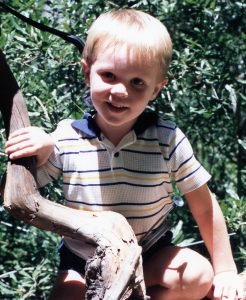
A traumatic birth left Brandon with severe learning disabilities. But music was the catalyst for him to learn and understand information
Brandon was not an easy baby. Awake or asleep, he wanted me to hold him. Ear infections never cleared up. And daily doses of low-grade antibiotics did nothing to prevent them. He had significant language delays. We hired a speech and language therapist to help him. He was three.
At the age of five, he went through extensive testing. Eventually, SPECT scans (nuclear images of the brain) revealed various issues. Educational psychologists and therapists told us that because of the seriousness of his learning disabilities, it was unlikely he would graduate from high school and college was out of the question. We were told to brace ourselves for a rough-go so far as anything related to learning.
They were right—it was a rough go. Trying to help Brandon understand the basics was both discouraging and overwhelming.
But, if you have a child with learning disabilities, listen up:
DO NOT GIVE UP! THEY CAN LEARN!
And I’ll tell you why: Music will make a difference. It did for Brandon and it will for your child, too.
Music and the Brain: Why Music Makes a Difference
Like so many children, Brandon loved and responded to music. So, I used different forms of music to help him learn:
- musical games & rhymes
- singing songs
- playing classical music while he was doing homework
- teaching him piano
I was convinced that parts of his brain, rather than malfunctioning, were in need of the kind of exercise that one gets from studying a musical instrument. It was true—music became the catalyst for him to learn and process information. Music is a vital part of the learning process for all children (learning disabled or not).
Why? Because learning a musical instrument exercises the entire brain (left, right, front, back) simultaneously. And because of this, music makes the learning process easier and more accessible for kids.
Music and the Brain: 4 Ways Music Builds the Brain:
#1: Music and the Brain: Music Strengthens the Auditory, Visual, and Motor Areas of the Brain
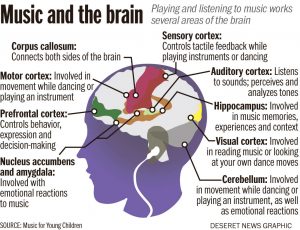
Here is an illustration of how music exercises the entire brain; particularly the auditory, visual and motor areas of the brain. These are all areas that are important to learning. (used by permission: Deseret News Graphic)
These areas of the brain lay the foundation for speech and language, reading, math, and brain organization. Because music strengthens and exercises these areas, it is a way all kids can learn and learn easier. Scientific research shows that all kids involved in music have:
- Better language skills
- Better reading and math skills
- More organized
- Have better attention skills
- Do better on standardized tests
Suggestion:
The best way to academically help any child is to get them involved with music. Think of it as brain aerobics.
Find group lessons, private lessons or utilize school music programs. Check out your neighborhoods for teachers and programs. Kindermusik and “Let’s Play Music” are both excellent programs and offer lessons starting around 18 months of age.
Involvement in music will also help your child build friendships and learn important values.
Here is a chart breaking down how music strengthens the auditory, visual/spatial and motor areas of the brain:
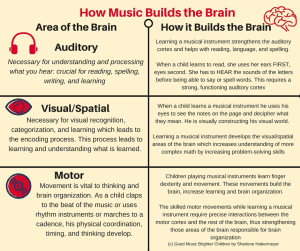
All areas of the brain need to be functioning for optimal learning. Here is a breakdown of how music strengthens each area of the brain thus aiding in the learning process (taken from Good Music Brighter Children)
Success With Music Lessons Can Be Slow
Don’t get discouraged if your LD child doesn’t immediately have success playing an instrument.
Brandon started group lessons at age three and it was extremely difficult for him to coordinate his fingers on the miniature keyboard. With time, he slowly improved. At age seven, I tried to enroll him in private lessons. No piano teacher would take him because he couldn’t remember where “middle C” was on the keyboard from one minute to the next.
So, I taught him myself. I color-coded the keyboard two octaves up and two octaves down. I colored his music to match. Then I pointed to the note on the music and to the key on the keyboard. Was it a painstaking exercise? Yes, but it worked. Over time, his spatial ability improved significantly. (see Anybody Can Play Piano for a similar program).
#2: Music and the Brain: Listening to Classical Music Helps with Memory (Auditory)
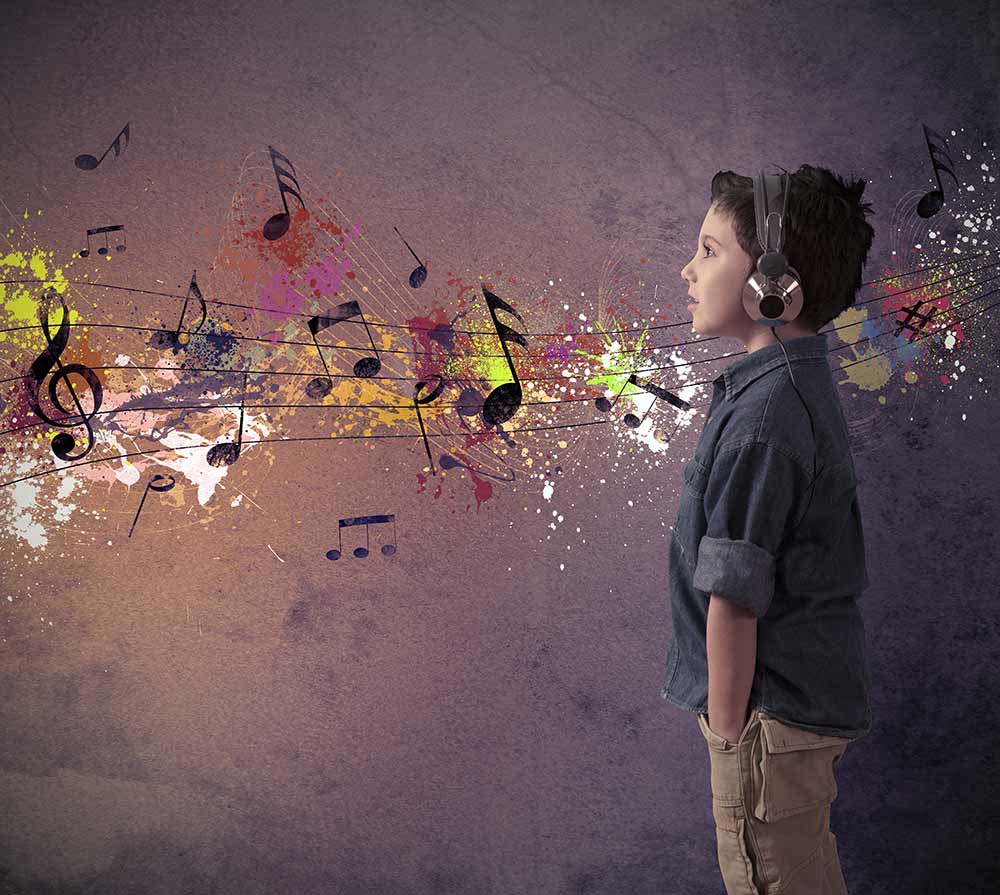
Listening to classical music can change the brain and help children, teens and adults learn information easier. It also enhances memory
Certain pieces of classical music can change the way the brain processes information and help us absorb, retain, and retrieve information (all components of memory).
When your child listens to this music, the electromagnetic frequency of the brain changes thus allowing him/her to focus and concentrate better. Memory and retention of information will increase. This is especially important for LD kids who have difficulty concentrating, focusing, or staying on task.
Suggestion:
Try playing Handel’s “Water Music” or Bach’s “Brandenburg’s Concertos” as background music while your children are doing homework. It takes approximately 15-20 minutes for this “learning mode” to kick in so play prior to starting homework tasks. I always played this music for my boys while they were studying. And, it works! Click here to find out more information about how listening to music works.
#3: Music and the Brain: Marching Organizes and Energizes the Brain (Motor and Visual)
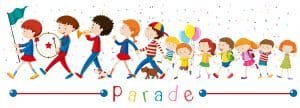
Marching to music helps organize the brain. When your child is having difficulty concentrating, have them march around the house to music. It will energize their brains.
If you notice your child acting sluggish, she/he may need a boost of energy. Marching will do the trick! Put on marching music and march around the house to the beat of the music (arms swinging and knees up high). Marching wakes up and organizes the brain, and gets it working on all four cylinders.
Because Brandon had difficulty staying on task in the morning, we turned “marching to music” into a game with everyone in the family participating. The boys woke up to marching music and all their morning movements incorporated marching:
- into the bathroom
- making their beds
- getting dressed
- marching to breakfast
- putting their backpacks together
Marching is similar to what crawling does for a baby—it organizes the brain and increases concentration and focus.
Suggestion:
Incorporate marching into your daily routine: before you send your kids off to school or after school or before doing homework. Try: “The Stars and Stripes Forever,” or “Semper Fidelis” (John Philip Sousa). It’s a fun, energizing, and brain-boosting activity for all your kids.
#4: Music and the Brain: Rhythm Helps Kids Learn (Auditory, Motor)
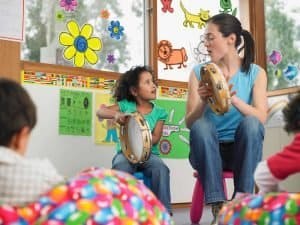
Use rhythm instruments to bang out, clap out or sing out spelling words or math facts your kids need to learn.
Music is built on melody, harmony, and rhythm—with rhythm being the most important element of music. It is what helps us to recognize a piece of music and motivates us to tap our feet to the beat of the music. Singing or chanting spelling words or math facts to a repetitive rhythm helps kids learn and commit the information to memory.
Try this:
- Find a piece of music or a nursery rhyme with a strong rhythm that your child enjoys.
- Remove the lyrics
- Sing along with the rhyme as you incorporate spelling words, math facts, geography or history facts.
Suggestion:
There are some wonderful nursery rhymes with a strong beat that work. For younger children try:
- “Miss Mary Mack,”
- “The Lady with the Alligator Purse,”
- “Down by the Bay,” or
- “The Alphabet Operetta” by Mindy Manley Little.
For older children use rhythms found in rap music—eliminate the lyrics and using the repetitive rhythms clap out, beat out (with rhythm instruments), or sing out, multiplication tables, spelling words or history facts.
These are just four ideas of how you can incorporate music into learning. I include many more ideas in my book (Good Music Brighter Children) along with a 50-page Resource Section chock full of fun educational ideas, books, music, games, etc.
What Happened to Brandon?
What happened to Brandon? He graduated from high school, went on to college and graduated in Film and Philosophy…with a University G.P.A. of 4.0. And to this day, he still practices the piano and listens to music.
Music makes a difference.
What have been your experiences with music and your children? Have you found that your children and teens do better in school for being involved with music?> Would love to know your experiences! Please comment in the section below.
Click here to access the 2-minute video of the blog.
Want to remember this post? Post, “4 Insanely Awesome Ways Music Helps Kids Who Struggle,” to your favorite Pinterest Board!
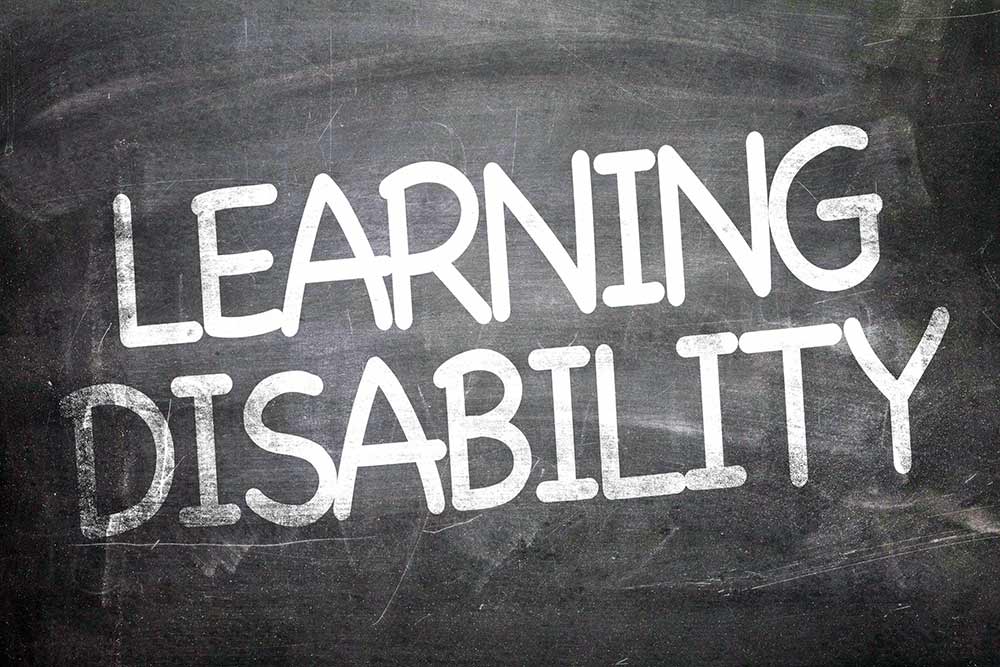
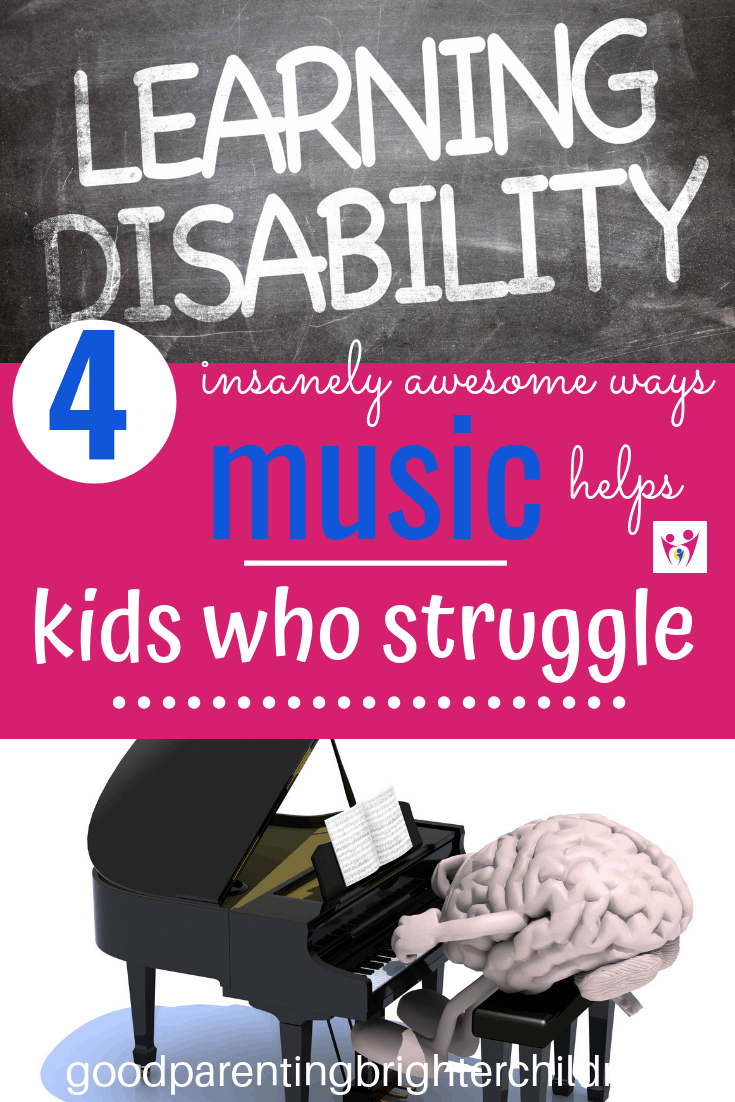
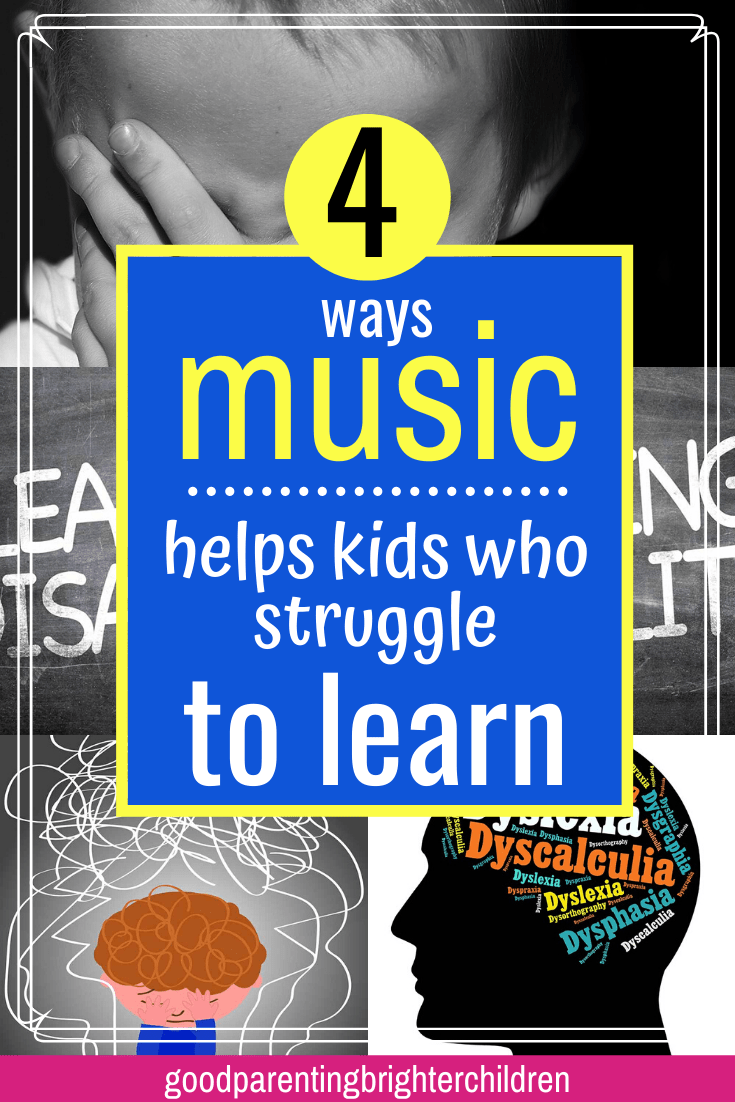
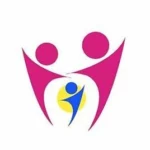

Hi! I have been a music teacher for 34 years. In my third year of teaching a lovely grade 3 girl started piano lessons with me. I wasn’t aware that she had dyslexia. I teach my students with patience and encouragement. In November that year her teacher at school sent her mother with a message: that her daughter made such excellent progress through the year that the result was fantastic- she could go back to a main stream class in grade 4!!! The teacher and I agreed that the piano lessons were the reason for the wonderful outcome!!! I am still inspired and blessed for touching her future!!
I am currently teaching marimbas at a school for learning and socially challenged students! What an honour to still touch the future!!!
I am very excited to become part of your blog and receive and share future information and stories!!!
Thank you! Anna
Anna–what an amazing and inspiring story–thank you for sharing! Like you have found–music IS the social and academic difference in not only children who struggle academically but all children. My son who had severe learning issues is an example of the power of music–it changes lives for the better! And it should be a mandatory subject taught in schools–right along with reading, writing, and math! Best of luck with the fabulous work you are doing!
Sharlene,
You and Mark are incredible parents. Every time I hear your story about Brandon all I want to do is cry. The tears aren’t from pity or me feeling bad for you all, but out of pride and happiness that you did everything you could for Brandon and ultimately created an amazing adult! The lengths you went to make sure that he was successful in life speak volumes of the person you are to the core. Thank you for being you and sharing what you’ve learned with the world! We’re all pretty lucky to have you in our lives. Keep doing what you’re doing!
Tiffany–you are too kind. You and Patrick KNOW exactly how much work goes into helping our kid(s) become productive adults that are also good people. And Zach is an example of all of your hard work and efforts! Thank you for your kind words and constant support–it’s appreciated!
I love your story about Brandon. It’s obvious, from reading your BLOG, that you have a LOT of patience, and SUCCESS! I don’t know that I could have done what you did! I do know that music has “fed” my soul since I can remember—-from my mom singing, my siblings and I singing while my oldest sister played the piano, my mom teaching us how to do the Big Apple, Charleston, and other dances in our kitchen. Music has elicited so many emotions throughout my life. JOY! PEACE, HAPPINESS! We all have learned many things using music: our ABCs to books in the Bible, etc. Music is a GIFT that helps so many in so many ways. Couldn’t do without it!!!
Thank you, Cheryl, for sharing these great experiences you have had during your life with music. Music speaks the “universal language” and you have experienced exactly that! Like you, I couldn’t do without it. (and I love that your mom taught you to dance all those fun dances–what a great mom!)